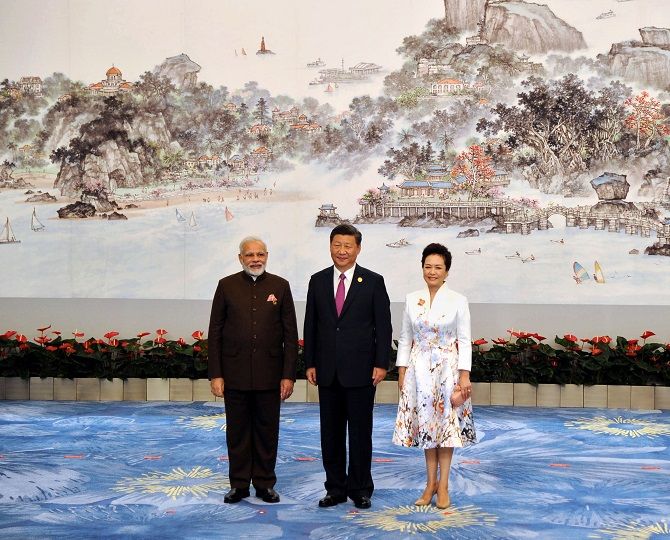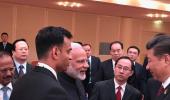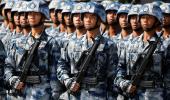'By crudely dragging the topic into the bazaar to flog it for momentary pleasure, we turned it into a dead carcass by the time Modi even got back from Xiamen,' says Ambassador M K Bhadrakumar.

The BRICS statement naming the terrorist groups active in the South and Central Asian region was brilliant news insofar as India and China could reach consensus on such a vital front of regional security hardly days after the two countries were peering into the abyss of a war.
But what followed turned out to be abysmal -- Indian media and analysts plunging into a Bacchanalian festival to celebrate BRICS as an 'anti-Pakistan' platform. Thoroughly inebriated, some hailed this as a diplomatic feat of Prime Minister Narendra D Modi.
Pride comes before a fall; false pride no less.
China has put the Modi bhakts on the mat by clarifying that its relations with Pakistan have been, are and will remain 'rock-solid' and that our chaps are naive -- with none other than China's top diplomat, Foreign Minister Wang Yi, saying so.
Of course, there are no surprises here.
Pakistan is a hugely important country for China.
Against the backdrop of the Belt and Road Initiative, the China-Pakistan relationship has even acquired global significance, the $50 billion China-Pakistan Economic Corridor being a crucial gateway for China to the world market bypassing the Malacca Straits and fast becoming a template of China's global strategies.
Therefore, it was downright stupidity to fancy that Indian diplomacy succeeded in creating a fracture in the Sino-Pakistan relations.
Now, does it mean that the BRICS formulation was inconsequential? Far from it.
Each development of this nature is a baby step on a journey that might prompt Pakistan at some point to seriously introspect as to where it is heading.
Pakistan has a major decision to take by evicting the terrorist groups based on its soil and optimising its seamless opportunities ahead -- thanks to its unique geographical location (amongst other favourable factors of advantage) -- to emerge as a prosperous, dynamic regional hub and a middle income country in a near future.
But it is a choice that Pakistan -- and Pakistani alone -- can make ultimately and that is where the BRICS formulation may help to 'poke' Pakistan.
However, the crudity of the Indian mindset toward Pakistan prevents our chaps from appreciating that it is in our country's core interests if China begins to influence the Pakistani thinking and attitudes on terrorism.
Look at the sheer sophistication of RFERL, a propaganda organ of US regional policies, while reporting on the BRICS statement.
The RFERL news analysis obliquely resorts to 'psywar' on Pakistan by commending China's role, but it concludes by taking note of a subtle shift appearing lately in the most recent statements by Pakistan's Foreign Minister Kawaja Asif regarding terrorism.
Simply put, Washington is hoping against hope to leverage China's influence on Pakistan to bring the Taliban to the negotiating table.
Whereas, the Indian calculus regarding the China-India-Pakistan triangle is hopelessly dated.
We do not have a genuine desire 'to strategically reconcile with Pakistan,' as the Global Times noted in a recent editorial.
We refuse to appreciate that the China-Pakistan relationship has ceased to be 'India-centric'.
No doubt, the Sino-Pakistani relationship factors in the strategic balance in South Asia. And there is a big military dimension to it as well, aside intense strategic communication and high-level interaction on security issues.
But from the Chinese viewpoint, India is no longer the raison d’etre of its partnership with Pakistan.
China is more than half a superpower. It has no reason to regard India as a 'rival', having by far outstripped India in its comprehensive national power.
A sense of rivalry would probably arise if India had a fighting chance to narrow this gap in a conceivable future, but, alas, that is improbable with the growing drift and acute contradictions in India's political economy.
If we comprehend this unpalatable truth, Indian diplomacy can reset its priorities.
No matter what Japan's Prime Minister Shinzo Abe may say next week during his visit, make no mistake that the international community has a fair understanding of what India is increasingly turning out to be today.
Our army chief is preparing to fight two wars simultaneously and an army commander is raring to cross the Line of Control with Pakistan, while India's most prestigious long distance train derails in the nation's capital due to poor maintenance of rail tracks.
What a bizarre order of priorities in our 'development agenda'!
India and China are 'natural allies' in the fight against terrorism.
Arguably, only China -- not the US, not Russia, not Japan -- can help India to get through to Pakistan to raise its comfort level vis-à-vis our country and unlock the door leading to dialogue and normalisation, which has been slammed shut on account of the profound rift over cross-border terrorism.
Suffice to say, we should have shown the maturity to keep our heads below the parapet and let the BRICS Declaration become a topic of private conversation between China and Pakistan.
After all, China as the host country of BRICS, is obliged to give some explanation to Pakistan.
By crudely dragging the topic into the bazaar to flog it for momentary pleasure, we turned it into a dead carcass by the time Modi even got back from Xiamen.
IMAGE: Prime Minister Narendra D Modi with Chinese President Xi Jinping and his wife Peng Liyuan at the welcome banquet for BRICS leaders in Xiamen, China, September 4, 2017. Photograph: Press Information Bureau











 © 2025
© 2025